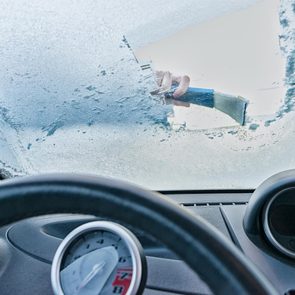Find out which states have laws against idling—and why you shouldn't be "warming up" your car in the first place

Is It Illegal to Idle Your Car?

It can be really unpleasant to hop in a cold car in the morning: Your nose starts to chill, your bum shivers on the frigid seat and your hands freeze on the icy steering wheel. It’s tempting to run outside and start the ignition so your car can warm up for a few minutes while you gather the rest of your belongings. But is it illegal to idle your car?
As enticing as it can be to get your car warm and toasty ahead of time, you could be damaging your engine in the process. Not only that, idling your engine could get you in hot water with the law. Read on to find out if, and why, it might be illegal to idle your car.
Get Reader’s Digest’s Read Up newsletter for more life tips, travel, tech, humor, cleaning and fun facts all week long.
Is it illegal to idle your car?
It can be, depending on which state you live in—or even city or county. No, your lawmakers don’t want you to freeze in your car in the morning. Anti-idling laws exist with a much bigger purpose in mind: to prevent air pollution. Punishments range from fines to written warnings. According to the EPA, more than two dozen states and many cities and counties have laws that limit the amount of time a vehicle can idle. A complete guide to idling measures in your state can be found at the American Transportation Research Institute.
States where it’s illegal to keep your car running

These are the states with anti-idling laws, where it’s illegal to warm up your car:
- Arizona
- California
- Colorado
- Connecticut
- Delaware
- District of Columbia
- Georgia
- Hawaii
- Idaho
- Illinois
- Kansas
- Maine
- Maryland
- Massachusetts
- Michigan
- Minnesota
- Missouri
- Nevada
- New Hampshire
- New Jersey
- New York
- North Carolina
- Ohio
- Oregon
- Pennsylvania
- Rhode Island
- South Carolina
- Texas
- Utah
- Vermont
- Virginia
- West Virginia
Before the 1980s, when car had carburetors, it was a rule of thumb to spend time warming up your car. But now that cars use fuel injection systems, there’s no benefit to warming up your vehicle.
In fact, not only is idling harmful to the environment, but it could also lead to mechanical problems. No one enjoys sitting in a cold car, but the process of warming up your car can decrease the life of your engine by stripping oil away from the engine’s cylinders and pistons.
If you still insist on warming it up, though, it should be for no more than 30 seconds, since the engine warms faster when you’re actually driving the car.
And if you drive an electric car, most likely you have a “preconditioning” feature, which allows you to warm up the battery and car interior beforehand. If you don’t have the feature, it’s recommended to warm up your car for a few minutes before driving—which won’t emit harmful fumes like a gas-powered vehicle.
Why trust us
At Reader’s Digest, we’re committed to producing high-quality content by writers with expertise and experience in their field in consultation with relevant, qualified experts. We rely on reputable primary sources, including government and professional organizations and academic institutions as well as our writers’ personal experiences where appropriate. We verify all facts and data, back them with credible sourcing and revisit them over time to ensure they remain accurate and up to date. Read more about our team, our contributors and our editorial policies.
Sources:
- American Transportation Research Institute: “Idling Regulations Compendium”
- Popular Mechanics: “4 Tips To (Safely) Warm Up Your Car This Winter”
- USA Today: “Should I warm up my car before driving on frigid winter days? Here’s what experts say”
- U.S. Department of Energy: “Winterizing Your Electric Vehicle”
- Recurrent: “What is Preconditioning for an EV?”



















